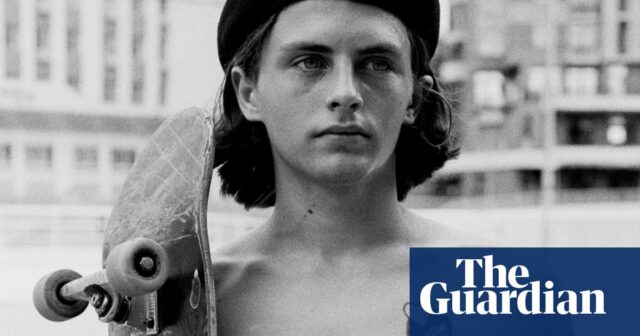Far from the frontlines, the streets of some Ukrainian cities may seem to be returning to a semblance of normality, but nothing is quite the same. War imposes itself at every turn, between the shell-torn buildings, the sandbags on the corners of caulked windows and the antitank obstacles – dozens of them are piled up under a tarpaulin, as pictured below. By reclaiming these scarred spaces, Ukrainian skateboarders want to give themselves permission to live. To regain control of their lives in the face of a war that blurs their bearings.
‘Ukraine is like a jail you can’t get out of and Kyiv is my cell. Only skateboarding allows me to escape’
Alexandr
‘What is left for us when we look ahead? Our horizon is nothingness. So we go skateboarding, that’s our only horizon’
Aleksandr
Skateboarder Alexandr, sums up the situation in which Ukraine’s young people found themselves in summer 2023. A generation suffocated in the middle of a war from which it cannot escape (men between the ages of 18 and 60 are not allowed to leave the country), living daily to the rhythm of the overwhelming news from the front, under the threat of forced enlistment on the street or a Russian airstrike.
‘It’s like a breath of fresh air in this swamp of problems. It helped me to face adversity’
Artem
Since the beginning of the Russian invasion, skateboarding in Ukraine has taken on a singular dimension: it is a way to escape. From a sport practiced in the company of homies, skateboarding has become a window to freedom in the middle of chaos and anxiety. A medicine for the trauma of war, a psychological support that has become vital for a disoriented youth. “A way of feeling alive, even when everything else is falling apart,” says Vasilkan, a skateboarder from Odessa.
Yet it is hard not to be drawn back to reality. Walking through the country’s skateboarding spots, war is present around every corner. Near vast brutalist-style squares, buildings lie gutted by Russian shelling and airstrikes.
Barricades block access to the damaged outlines of statues that skateboarders normally love to ride.
‘Strangely, I got used to war, to this permanent anxiety. She’s part of me now’
Vasilkan
Even the road composition reminds skateboarders of the situation: the rough ground that hinders them is turned towards the east and its Soviet past.
“Here, we grow up on asphalt, on poor quality ground for skateboarding. When you see the spots in Europe, it’s like dreaming with your eyes open,” says Eric from Dnipro.
Skateboarders are resolutely turned towards this Europe – the one in the west. Skateboarding appears to symbolise the fracture between Ukraine’s young people and a Soviet past that constantly pursues them, dragging them into a conflict from another time.
Ukrainian skateboarders who have not gone off to fight are fighting a completely different battle: to take back the streets and spaces marked by war, and allow themselves to live again.
‘A way to reclaim the streets and spaces marked by combat, through a sport historically oriented towards the west’
Robin Tutenges
Skateboarding is also a mentality. You fall, you get hurt, you suffer, you scream, then you get up again. And then you do it again and again and again. This mentality, known as “Thrasher” after the US skate magazine, serves as a psychological support in the face of the uncertainty of war.
“Giving it our all, skateboarding faster, higher, that’s what keeps us going,” says Andrey, a 17-year-old Ukrainian who lived for several months under Russian occupation in Kupiansk. Roma, also from Kharkiv, adds: “Skateboarding isn’t just about going out on the street and playing sports. Above all, it’s a way of feeling alive, even when everything around you is falling apart.”
-
Robin Tutenges/Collectif Hors Format, with the support of France’s National Centre for Visual Arts (CNAP).
The photographs are being exhibited at the Centre Photographique Marseille until 18 January 2025 and at the Centre Claude Cahun in Nantes from 5 February to 30 March 2025.
-
Art direction and design Harry Fischer. Development Pip Lev. Picture editor Matt Fidler.






